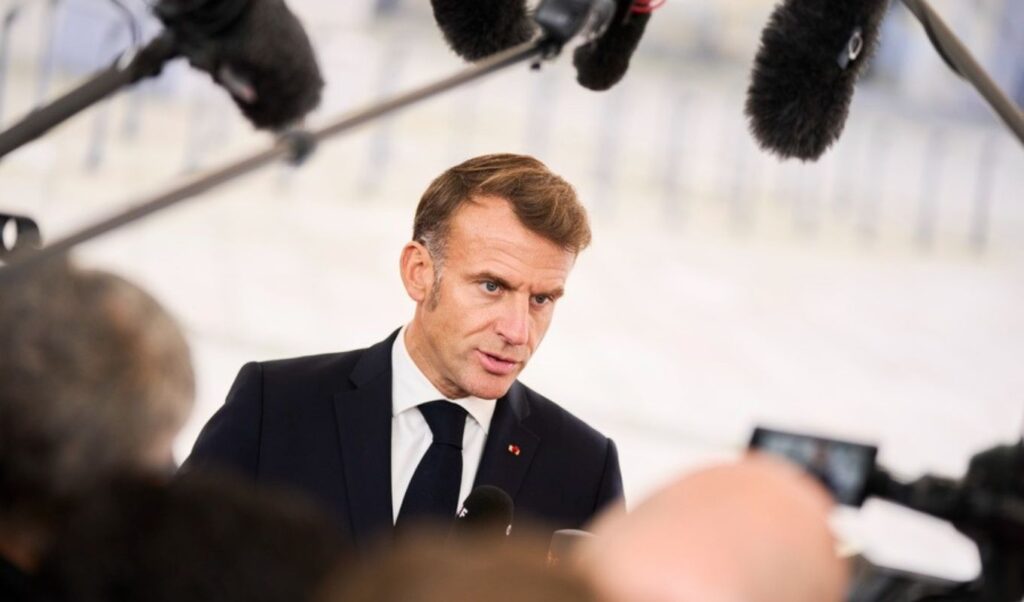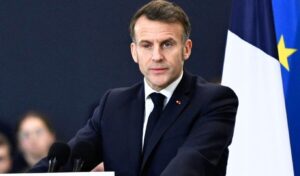France’s political deadlock is deepening, with Emmanuel Macron being called upon to make decisions and perhaps not at all coincidentally, he was seen walking alone along the Seine yesterday, on a cold autumn morning, reminiscent of Charles de Gaulle when he was navigating a similar “impasse” in his political career (which was then “setting”). As Reuters reports, bodyguards kept their distance in front and behind him as he passed through a wrought iron gate to the stone embankment wearing a black coat. The scene, captured from a distance on video and broadcast on French television, recalled images of Charles de Gaulle seeking solace in the windswept plains of Ireland after his resignation at the end of the 1960s – a leader retreating introspectively as his political era approached its end.
It should be recalled that in March 1969, de Gaulle announced to the French people his intention to proceed with a series of reforms in the Senate and local government. To approve these changes, he called a referendum for April 27. From the beginning, the French president declared that if the French did not vote in favor of his reforms, he would resign from office. Which is exactly what happened.
The French rejected de Gaulle’s proposals by approximately 53%, and the next day, on April 28, he resigned. Many accused him of calling the referendum knowing that the majority of French would vote against it. According to this view, the French president was seeking an excuse to resign, to avoid facing the consequences of the economic crisis in the country. In the 1969 presidential elections, the Gaullist Georges Pompidou emerged as the new president.
Macron is president until 2027, but the resignation of Sebastian Lecornu, his fifth prime minister in two years, has increased the chances that he might resign from office. Macron seemed determined to avoid this fate on Monday, giving Lecornu two more days for talks with the opposition, in an attempt to chart a way out of the deadlock, however it seems impossible for him to achieve anything.
Macron’s options and France’s next steps
According to BFMTV, the first would be to change tactics and agree to appoint a prime minister from the left of the political spectrum (most likely a Socialist), as demanded by the Socialist Party and the Greens. This would be an extremely symbolic move. Although the Left Alliance, the New Popular Front won the snap parliamentary elections, Emmanuel Macron has so far refused to appoint a left-wing figure.
As an argument, the president’s close associates have repeatedly explained that the left would not be able to secure a majority in Parliament. However, it doesn’t seem impossible that a relatively “consensual” figure could manage to unite Macron’s bloc in Parliament with parts of the New Popular Front. However, the big problem is that it would create conditions of “cohabitation,” with the president and prime minister being of opposite ideological orientations, a fact that has created problems in French political history.
Alternatively, he could dissolve Parliament and call new parliamentary elections. However, this option doesn’t seem attractive, as Marine Le Pen’s far-right party leads in polls with about 32% of the vote, while the left-wing New Popular Front alliance follows with 25%.
A more “radical” possibility is Macron’s own resignation, something demanded by parts of the opposition, especially from the left, while such voices were also heard from Republicans deputy leader David Lisnard. In case of his resignation, as Euronews reminds us, the Constitution provides for the temporary assumption of duties by Senate President Gérard Larcher, with new presidential elections to be held within 20 to 50 days. However, this scenario remains unlikely. Macron has repeatedly committed to serve until 2027, insisting he will not abandon his mandate.
An even more extreme step than resignation would be Macron’s removal from office by parliament. This is a scenario more enthusiastically supported by the far-left France Unbowed (LFI) party, which has long argued that Macron’s leadership has become incompatible with the exercise of his duties.
The 2007 constitutional reform provides a legal avenue: in cases of “breach of duty that is manifestly incompatible with the exercise of the mandate,” the president can be removed, as Euronews reports. However, the process is extremely complex. Since its creation, the procedure has never succeeded.
What will happen with the budget?
For now, France is under caretaker governance. As after the fall of François Bayrou’s government in September, Lecornu and his ministers can only handle day-to-day affairs. They cannot push through major reforms or make significant appointments.
This means that the most urgent task facing France – approving the 2026 budget – cannot proceed from Lecornu’s team.
His resignation made Monday’s budget presentation void, and the new government will now have to draft and defend a new financial bill in parliament.
According to French law, the proposal must be submitted by October 13, to allow time for discussion and constitutional review.
However, this deadline is impossible to meet, even if a new prime minister is appointed quickly, as preparing a revised budget would take weeks.
Parliament could vote only on the revenue part of the budget, ensuring that the state could continue to collect taxes.
Another alternative would be adopting a “special law” that would temporarily extend the previous year’s budget, as happened in 2025. This would allow the state to continue funding public services while political negotiations continued.




